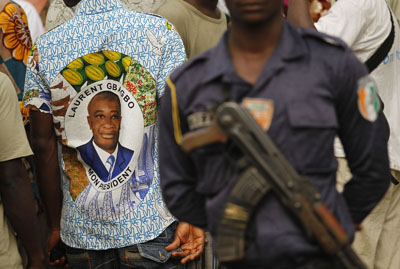
Given the personal and professional passion that those of us at Enough have for the prevention of mass atrocities, international justice, human rights, Africa, democracy – all of the above – it is with great concern and alarm that many of us have followed the unfolding political and looming humanitarian crisis in Côte d’Ivoire.
After a nearly two-month stand off between former President Gbagbo, who refuses to admit defeat, and newly-elected President Ouattara, who is sequestered in a U.N.-fortified hotel, the situation for civilians is grave and looks likely to become even more dire.
Speaking to a large audience in Washington last week via telephone from his compound in Abidjan, President-elect Ouattara said that at least 250 people had been killed and over a thousand are hospitalized. The U.N. refugee agency estimated that as of January 11 more than 25,000 Ivorians had fled into neighboring countries, with about 600 people arriving daily in Liberia.
Côte d’Ivoire’s current conflict is tragically reminiscent of post-election violence that erupted in 2000. In an op-ed earlier this month, Human Rights Watch’s Matt Wells emphasized how history is repeating itself. Ten years later, even some of the actors are the same:
After the 2000 elections, investigations by the United Nations, Human Rights Watch and others found a post-election death toll of 200, with hundreds more seriously wounded, and scores tortured – the vast majority actual or perceived supporters of Ouattara. A mass grave on the outskirts of the financial capital, Abidjan, contained 57 bodies – most massacred while in detention.
Despite extensive evidence of these abuses, no one was brought to justice for the crimes. The captain at the detention camp where the executions occurred was even promoted.
The lesson is clear for the international community, Côte d’Ivoire’s leaders, and other post-conflict countries, particularly where conflict has had an ethnic dimension: Gloss over atrocities in the name of “moving forward” – essentially condone impunity – and the tensions that prompted the violence in the first place will not naturally dissipate; they will fester, if under the surface.
And so Ivorians now live with the tragic consequences and wait to see how the precarious situation will unfold day-to-day. “The streets and markets are crowded with people again going about their daily business, though people are still cautiously stocking up on supplies and keeping an eye out for any signs of coming danger,” reported Abidjan-based writer Rebecca Sargent earlier this month. In some neighborhoods of the capital that have been especially hard hit with raids by Gbagbo-aligned security forces, people are bracing for more violence.
In many ways Côte d’Ivoire is in the throes of a conflict that fits within the mandate of Enough, and we’ve been asked about whether institutionally we’re going to weigh in. However, while the organization has neither researchers on the ground there nor ample expertise on the underpinnings, politics, and regional dynamics of the conflict, we’ll continue to follow the coverage of those who do.
Larger human rights organizations, academics with a focus in West Africa, think tanks, and bloggers are providing regular updates and analysis of the situation. Here’s a selection we recommend, in addition to the sources linked above:
- The U.N. Office for the Coordination of Humanitarian Affairs released this excellent map charting displacement. It also includes a useful inset map showing the regional breakdown of loyalty to either Gbagbo and Ouattara and some reference links worth checking out.
- Part 2 of the detailed post by Rebecca Sargent, noted above. Sargent is based in Abidjan and blogs at A Peace of Conflict.
- Yale professor Chris Blattman offers his own analysis and highlights lots of good links.
- Blog aggregator Global Voices on Côte d’Ivoire
- Rwanda-based reporter Jina Moore prompted and then hosted some interesting exchanges on the use of the word ‘genocide’ in relation to the current crisis in Côte d’Ivoire.
- Human Rights Watch describes the disappearances of opposition supporters and threats on U.N. peacekeepers and the likelihood that those responsible for crimes could be tried by the International Criminal Court.
Know of other good resources? Drop recommendations in the comments section.

